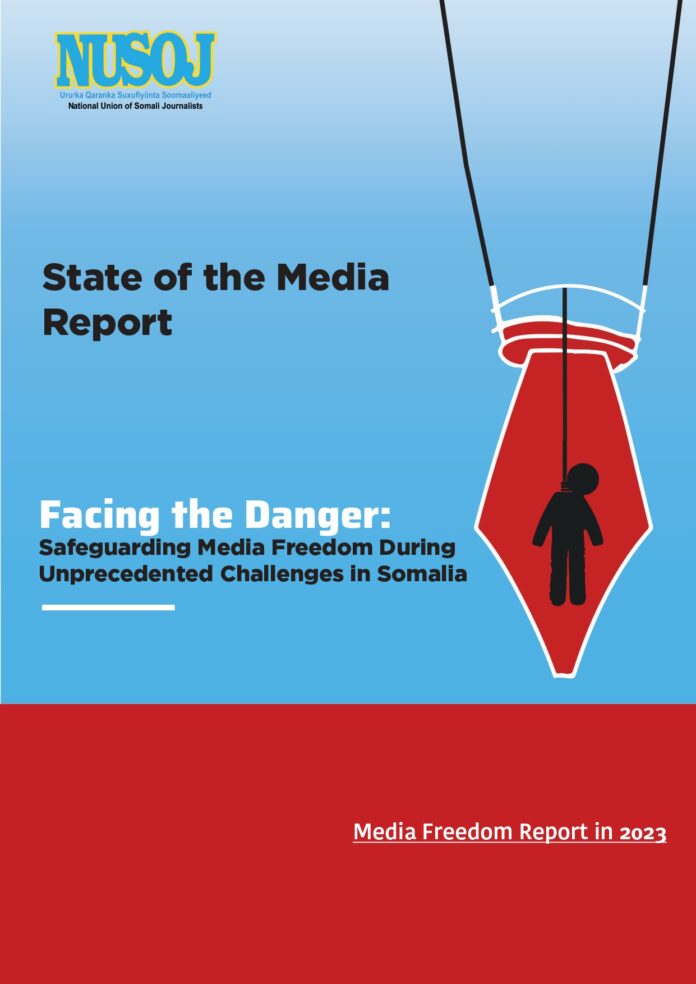The National Union of Somali Journalists (NUSOJ) has today released its State of the Media Report, detailing the severe repression, threats and challenges faced by journalists that have crippled the media’s operating environment in Somalia over the past year, documenting numerous serious violations, including arrests, detentions, torture and even the murder of a journalist, painting a grim picture of the media freedom situation in the country.
The report, which systematically recorded cases of attacks from January to December 2023, reveals that over 60% of the reported cases involved brief arrests and detentions, often used as intimidation tactics to suppress critical reporting. Prolonged detentions accounted for 17% of the attacks, raising serious concerns about due process and the conditions of confinement. Equally alarming were instances of torture, also making up 17% of the cases, highlighting the severe physical risks journalists face.
Police forces were identified as the primary perpetrators, responsible for nearly 87% of the incidents. This indicates systemic issues within law enforcement regarding the treatment of journalists. The National Intelligence and Security Agency (NISA) was involved in approximately 9% of the attacks, further pointing to the role of state actors in suppressing media freedom.
Mogadishu emerged as the most dangerous place for journalists, with nearly 39% of all attacks occurring in the capital. This concentration of attacks suggests a targeted effort to deny or control media coverage in the heart of the country’s political landscape. Somaliland, often perceived as relatively more stable, accounted for about 31% of the attacks, challenging its reputation as a haven for peace and security, where journalists feel insecure due to judicial persecution and police brutalities.
The report highlights the tragic loss of Abdifatah Moallim Nur, also known as Qeys, a respected journalist and Director of Somali Cable TV. He was killed on 16 October 2023 in a suicide bomb attack at the Blue-Sky restaurant in Mogadishu, believed to be orchestrated by Al-Shabaab. This attack underscores the severe risks journalists continue to face and the urgent need for enhanced safety measures.
“The findings of this State of the Media Report are deeply troubling and paint a bleak picture of the current media freedom landscape in Somalia,” expressed Omar Faruk Osman, Secretary General of NUSOJ. “The sheer number of arrests, detentions, instances of torture and even murder faced by journalists is appalling and intolerable. This level of repression is a direct threat to press freedom and undermines journalists’ ability to fulfil their professional duties rather than the dictates of their tormentors.”
In addition to individual attacks on journalists, the report also details assaults on news media organisations in the Southwest State, Puntland and Somaliland. In the Southwest, heavily armed forces loyal to the mayor of Barawe district attacked Radio Barawe, leaving it off the air for six days. In Puntland, media houses faced substantial editorial interference, pressure for content manipulation and intimidation from political actors, especially during the run-up to the elections. Similarly, in Somaliland, directives from the Ministry of Information led to self-censorship and a media blackout on sensitive issues such as the situation in LasAnod. These external and internal pressures severely compromised the ability of media houses to report accurately and independently.
Financial instability among journalists is another significant issue. Many journalists earn low wages, with a substantial portion working on a commission basis or under a retention scheme. This economic vulnerability leads to self-censorship, poor quality reporting and the absence of critical coverage, as journalists tried to avoid covering issues of public interest, though some may be controversial, to maintain their employment. These poor working conditions continue to undermine the true essence of a free and vibrant media operation.
“We are profoundly concerned about the financial instability and poor working conditions that drive journalists to self-censorship,” he added. “This compromises the quality and independence of their reporting, which is essential for keeping the public well-informed,” added Osman.
Female journalists face additional threats, particularly sexual and gender-based violence (SGBV). NUSOJ documented 31 cases of such violence and harassment in 2023. These attacks have profound impacts on female journalists’ physical and psychological well-being, professional development and career progression, leading to a chilling effect on media freedom.
“The alarming and unacceptable threats faced by female journalists, particularly sexual and gender-based violence, must not be ignored. These violent acts severely damage their physical and mental health, hinder their professional growth and obstruct their career advancement. Such conditions not only endanger their safety but also fundamentally undermine the overall freedom of the media” stressed Osman.
The outdated and draconian penal code of 1964, along with the amended media law of 2020, poses significant threats to media freedom due to their vague and broadly defined provisions. Articles on defamation, false news and offending the dignity of individuals or institutions in the penal code are frequently used to criminalise journalistic activities, leading to self-censorship, legal insecurity and limiting the public’s access to important information.
To address these issues, NUSOJ calls for comprehensive legal reforms to eliminate vague provisions that criminalise journalism and to repeal or amend the restrictive 2020 media law. The report also advocates for the establishment of independent bodies to investigate and prosecute cases of harassment, torture and unlawful detention of journalists. Additionally, it calls for training initiatives for judges and legal professionals on media freedom and journalists’ rights.
Improving the safety, financial stability and support systems for journalists is crucial to fostering a free and independent media in Somalia. NUSOJ recommends developing and enforcing safety protocols, particularly in high-risk areas and advocating for fair wages and better working conditions to reduce financial instability. Addressing gender discrimination and promoting equal opportunities for female journalists are also essential to ensuring a diverse and robust media landscape.
The State of the Media Report by NUSOJ is a flagship report that has been produced for the 13th consecutive year. It is a critical tool in the ongoing struggle to defend media freedom and the rights of journalists in Somalia. Through rigorous monitoring, verification, documentation and advocacy efforts, NUSOJ aims to create a safer and more supportive environment for media professionals, enabling them to perform their crucial role in society without fear.
—
State of the Media Report can be downloaded at this link:
nusoj.org/wp-content/upl…






